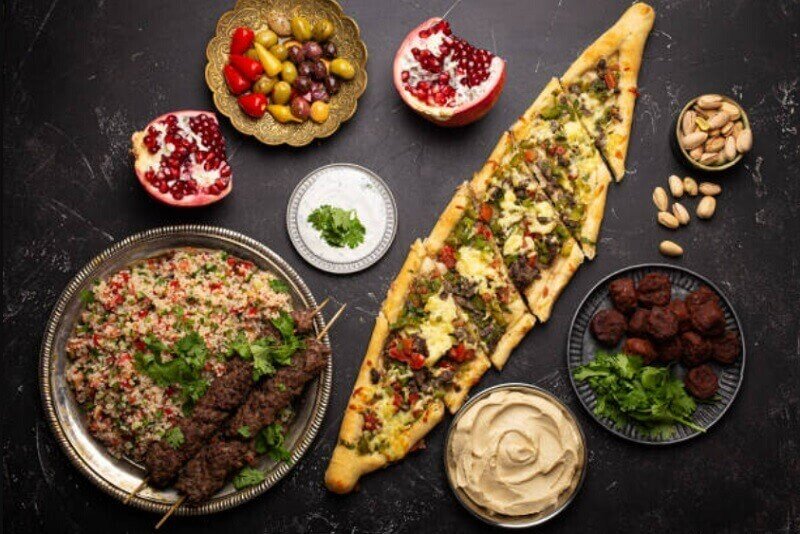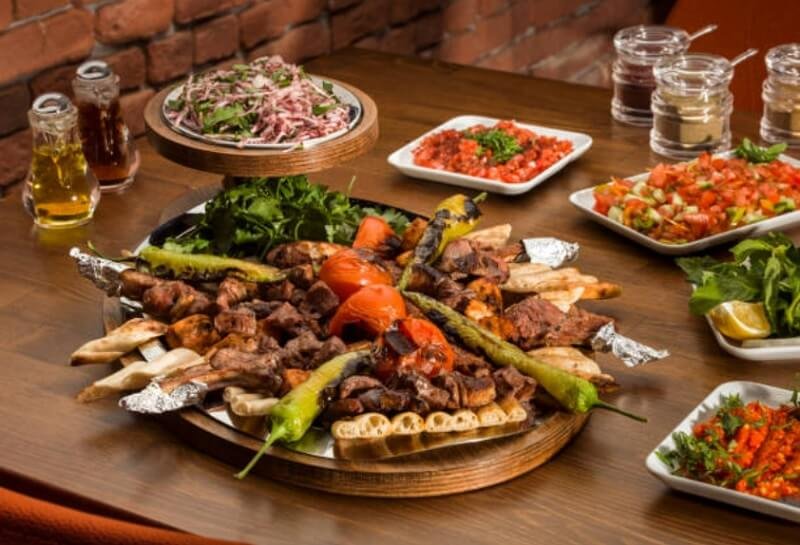Introduction to Turkish Foods for Every Special Occasion
In the heart of Turkey lies a culinary tradition as vibrant and diverse as its landscapes. Turkish cuisine isn’t just about nourishment; it’s a celebration of culture, history, and hospitality. From the bustling streets of Istanbul to the serene villages of Anatolia, Turkish foods weave a rich tapestry of flavors, textures, and aromas, inviting all who taste them to embark on a journey through time and tradition.
Ramazan Bayramı (Eid al-Fitr): Sweet Celebrations
Ramazan Bayramı, known as Eid al-Fitr in the Islamic calendar, marks the end of Ramadan, a month of fasting, prayer, and reflection for Muslims worldwide. In Turkey, this joyous occasion is celebrated with an abundance of traditional sweets, each one more tempting than the last. One of the special Turkish foods called Baklava, with its delicate layers of phyllo pastry, honey, and crushed pistachios, is a hallmark of Eid al-Fitr feasts, symbolizing the sweetness of life and the bounty of the season.
Alongside baklava, tables are adorned with şekerpare, small, syrup-soaked cookies, and lokma, airy dough balls drenched in sugar syrup and often shared with neighbors and friends. These sweet treats not only satisfy the palate but also serve as tokens of generosity, gratitude, and goodwill, embodying the spirit of Eid al-Fitr and the bonds of community that unite us all.
Weddings: A Feast Fit for Royalty
Turkish weddings are legendary for their opulence, extravagance, and, of course, their sumptuous feasts. From the momentous ceremony to the joyous reception, every aspect of a Turkish wedding is infused with tradition, symbolism, and love. Central to the festivities is the wedding feast, a lavish affair featuring an array of mouthwatering dishes that showcase the best of Turkish foods.
Turkish foods includes Kuzu tandır, succulent lamb slow-roasted to perfection, takes pride of place at the table, symbolizing prosperity, abundance, and the beginning of a new chapter in the couple’s lives. Accompanying the kuzu tandır are dishes like etli pilav, fragrant rice pilaf studded with tender pieces of meat, and köfte, spiced meatballs bursting with flavor and tradition. Each Turkish foods tells a story, honoring the union of two souls and the bonds of family, friendship, and love that bring them together.
Kurban Bayramı (Eid al-Adha): A Time for Sacrifice and Sharing
Kurban Bayramı, or Eid al-Adha, is a solemn yet joyous occasion in the Islamic calendar, commemorating the willingness of Ibrahim (Abraham) to sacrifice his son Isma’il (Ishmael) as an act of obedience to God. In Turkey, this sacred festival is observed with prayers, rituals, and acts of charity, including the sacrifice of an animal, typically a sheep or goat, whose meat is then distributed to family, friends, and those in need. Central to the celebrations are traditional dishes that reflect the spirit of sacrifice and sharing that defines Kurban Bayramı.

Kavurma, tender pieces of braised meat cooked in its own juices until meltingly soft, is a staple of the festive table, symbolizing abundance, generosity, and the blessings of community. Alongside kavurma, other Turkish foods like etli pilav, a fragrant rice pilaf cooked with meat and spices, and succulent kebabs, grilled to perfection over an open flame, add depth and flavor to the feast, inviting all who partake to share in the blessings of the season and the bonds of brotherhood that unite us all.
Birthdays: A Sweet Symphony of Celebration
In Turkey, birthdays are a time for celebration, reflection, and, of course, indulgence. Whether young or old, each birthday is a milestone worth commemorating, and what better way to celebrate than with a feast of traditional Turkish foods and sweets? Baklava, with its layers of flaky pastry, nuts, and honey, is a perennial favorite, symbolizing the sweetness of life and the joy of another year lived. Alongside baklava, tables are laden with şekerpare, delicate sugar cookies soaked in fragrant syrup, and revani, a moist semolina cake flavored with lemon and drenched in sweet syrup, each one a testament to the joy of the occasion and the love of family and friends.
Religious Festivals: A Feast of Gratitude and Generosity
Religious festivals hold a special place in Turkish culture, providing an opportunity for reflection, prayer, and communal celebration. During festivals like Eid al-Fitr and Eid al-Adha, Turkish families come together to share meals that reflect the values of gratitude, generosity, and compassion. Köfte, spiced meatballs bursting with flavor and tradition, are a staple of the festive table, symbolizing the unity of the community and the blessings of the season. Alongside with these Turkish foods köfte, pilav, fragrant rice pilaf cooked with meat and spices, and güllaç, delicate rosewater-soaked pastry, add depth and flavor to the feast, inviting all who partake to share in the joy of the occasion and the bonds of brotherhood that unite us all.
Anniversaries: A Celebration of Love and Togetherness
Anniversaries are a time to celebrate love, commitment, and the journey shared by two souls. In Turkey, couples mark these special occasions with traditional dishes that speak to the depth of their affection and the richness of their shared experiences. From tender kuzu tandır, slow-roasted lamb redolent with spices and flavor, to savory dolma, grape leaves stuffed with a tantalizing mixture of rice, meat, and herbs, and flaky börek, pastry filled with cheese or meat and baked to golden perfection, anniversary menus reflect the depth of emotion and the joy of shared moments with these Turkish foods. Each dish is a testament to the love and devotion that bind couples together, inviting all who gather to celebrate to savor the richness of life and the blessings of love.
Conclusion
In Turkey, food isn’t just sustenance—it’s a celebration of life, love, and heritage. From the sweetness of Eid al-Fitr to the richness of wedding feasts and the symbolism of religious festivals, traditional Turkish foods serve as a bridge between past and present, connecting generations and preserving the essence of our shared culture. As we gather around the table to savor these culinary delights, let us remember the traditions that have shaped us and the bonds that unite us, and let us celebrate each special occasion with gratitude, generosity, and love.

